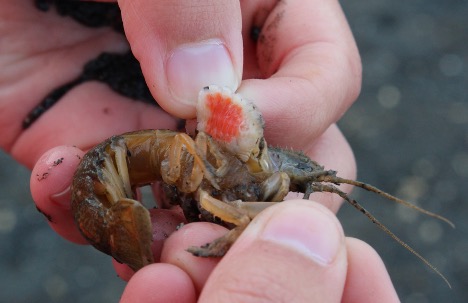Workshop will report on zebra mussels and other invasives
Date: Nov. 3-4, 2021
Time: 9 a.m. - 4:30 p.m.
Location: Online via Zoom

An orange and white invasive isopod, Orthione griffenis, parasitizes a native mud shrimp. Researchers from Oregon State University discovered large infestations of the isopod in Ketchikan and Sitka this summer and will present their findings at the Alaska Invasive Species Workshop.
The 2021 Alaska Invasive Species Workshop will be hosted online on Nov. 3-4. Zoom sessions will run from 9 a.m. to 4:30 p.m. both days. Registration is free this year.
The University of Alaska Fairbanks Cooperative Extension Service is coordinating the workshop with the Alaska Invasive Species Partnership, an informal statewide group of agencies, organizations and individuals.
This year’s workshop theme is “Join the Persistence: Working Behind the Screen to Prevent and Manage Invasive Species.”
In early 2021 Alaska became one of at least 32 states to report finding invasive zebra mussels in moss balls, which were being sold at local pet stores. Zebra mussels, a significant problem in the Lower 48, have not been detected in Alaska, thanks in part to efforts to prevent their spread. Upon discovery of mussels in moss balls here, invasive species managers and community partners halted their import and sale while educating the public about proper disposal. The effort is one example of the work to be celebrated at this year’s workshop.
Workshop speakers will discuss invasive species science, management and planning, while identifying emerging issues statewide. Topics include urban forest pest readiness, biocontrol opportunities and invasive species legislation. Coordinator Gino Graziano said the workshop helps coordinate invasive species management efforts and highlights new problems, particularly those that could cause economic or environmental damage.
One relatively new concern is the spread of a non-native marine creature in Southeast Alaska. Orthione griffenis, an invasive isopod that parasitizes native mud shrimp, was recently discovered in Ketchikan and Sitka by researchers from Oregon State University. They will discuss the threat posed by this isopod.
Several workshop presentations will look at elodea, an aquatic plant that crowds out native species and is difficult to control. Graziano said elodea can grow into places where salmon spawn and obstruct boats and planes. Other presentations will cover efforts to control northern pike in Southcentral Alaska and chokecherry trees in Fairbanks, Anchorage and other communities.
The agenda and registration information are available at alaskainvasives.org. For more information, contact workshop coordinator Gino Graziano at 907-786-6315 or gagraziano@alaska.edu.
MEDIA CONTACT: Julie Stricker, 907-474-5406, jestricker@alaska.edu


